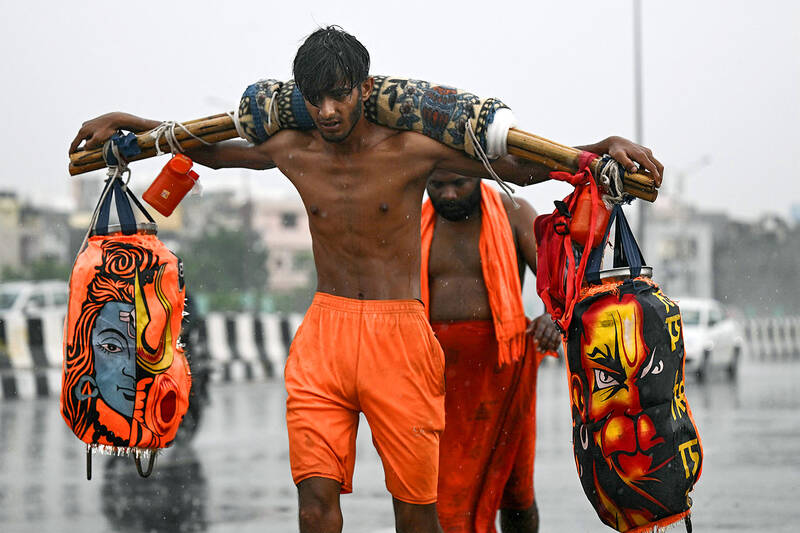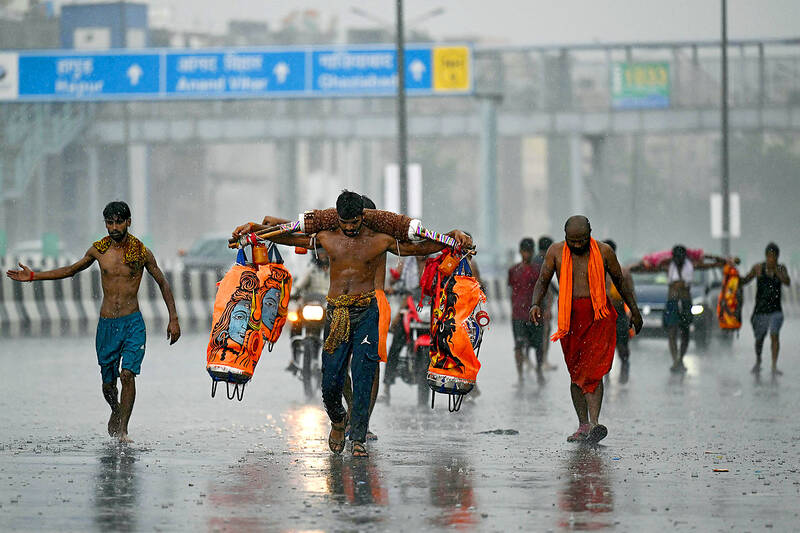The Hindu sacred month of Shravan honors the god of destruction Lord Shiva, and in northern India, it has become increasingly associated with mob violence by saffron-clad devotees.
Analysts say the increase in violence, and the muted response to stop it by the authorities, is a reaction to Prime Minister Narendra Modi’s Hindu-first politics.
Millions of people mark the month by trekking — some hundreds of kilometers — to collect holy water from the sacred Ganges river and carry it home to shrines, a celebration of the monsoon rains and new beginnings.

Photos: AFP
Many are young and poor men, dedicated to their deity — but also partying and taking a break from tough day-wage labor for a rare few weeks of fun, blaring loud music and smoking strong cannabis.
They are known as “Kanwarias,” after the bamboo poles across their shoulders they use to carry the heavy containers of sacred water.
This year, after the month-long pilgrimage started in late July, lawlessness surged.

Photo: AFP
The pilgrims have been caught multiple times on camera running riot — seen in videos shared widely on social media.
They include vandalizing a fuel station for being asked to stop smoking, violent road rage leaving passers-by grievously injured, and groups of Kanwarias fighting among themselves.
Pilgrims insist that hooliganism is restricted to a few stray incidents, blaming devotees who over-indulge in cannabis.
“There are rotten apples everywhere,” said 30-year-old Sachin Chawla, a Kanwaria puffing out clouds of fragrant smoke from a cigarette.
“Some people tend to get high and create a ruckus.”
‘SUBORDINATE TO THE PARTY’
Modi’s Hindu nationalist Bharatiya Janata Party (BJP) has boosted support for the travelers.
In the country’s most populous state Uttar Pradesh — whose chief minister is a hardline Hindu monk and key BJP leader — top government officials showered flower petals on the devotees from a helicopter.
That came days after pilgrims overturned a government security car.
The Modi government has “put across the message that the state is subordinate to the party in power”, said Sanjay Srivastava, an anthropologist teaching at SOAS University of London.
“This messaging seems to be clearly understood on the ground”.
Many devout Hindus are vegetarian during Shravan, and in several BJP-run states, local administrations ban meat on pilgrim routes.
But this year, some went further. Two state governments ordered restaurants to display the names of their owners, a rule that critics said was intended to divide restaurants by religion and target minority Muslims.
The order was later suspended by the Supreme Court.
ANCIENT TRADITION, NEW POPULARITY
Rickshaw-puller Kamal Kumar had spent two weeks walking nearly 200 kilometers carrying 70 liters of water in containers slung from a bamboo pole across his shoulders.
He had a day to go to his destination, a temple in the capital Delhi.
“I do it for Baba,” said the 20-year-old, using a term of endearment for Shiva. “Whatever I have, it is his doing.”
The number of devotees undertaking this journey is swelling by the year, according to official numbers.
Organizers estimate some 45 million people — more than the population of Canada — assembled in the holy Ganges-side city of Haridwar to collect water this year, a rise of 50 percent from 2017.
Most are poor, male, unemployed or work precarious menial jobs.
The offer of aid from a god has resounding appeal in “an uncertain economy with large-scale unemployment”, Srivastava said. “Everyone around me goes, so I also decided to go,” said Siddharth Kumar, a jobless 18-year-old who resides in a slum on the fringes of Delhi.
“I hope god does something for me and my family.”
Srivastava said more men now undertake the pilgrimage because there is a “broader climate of encouragement for participation in public religious activities.”
Popularity has been boosted within the context of “underemployed men’s activities, as well as a source seeking divine intervention for their precarious economic situation,” he added.
‘HOLIDAY’
The pilgrimage allows the working class to briefly “occupy the center stage,” said sociologist Ravinder Kaur, from the University of Copenhagen.
“It is as much an expression of vast class and caste inequalities that shape contemporary India,” she said. For many men, the journey is as much an opportunity to bond with friends.
Less dedicated devotees skip the walk, crowding into open trucks or on motorbikes, playing thumping music.
“I went with my friends from the neighborhood on our motorbikes,” said 23-year-old electrician Sunny Prajapati.
“Along with the chance to offer our prayers, we also get to go on a joy ride together — it is like a holiday.”

On April 26, The Lancet published a letter from two doctors at Taichung-based China Medical University Hospital (CMUH) warning that “Taiwan’s Health Care System is on the Brink of Collapse.” The authors said that “Years of policy inaction and mismanagement of resources have led to the National Health Insurance system operating under unsustainable conditions.” The pushback was immediate. Errors in the paper were quickly identified and publicized, to discredit the authors (the hospital apologized). CNA reported that CMUH said the letter described Taiwan in 2021 as having 62 nurses per 10,000 people, when the correct number was 78 nurses per 10,000

As we live longer, our risk of cognitive impairment is increasing. How can we delay the onset of symptoms? Do we have to give up every indulgence or can small changes make a difference? We asked neurologists for tips on how to keep our brains healthy for life. TAKE CARE OF YOUR HEALTH “All of the sensible things that apply to bodily health apply to brain health,” says Suzanne O’Sullivan, a consultant in neurology at the National Hospital for Neurology and Neurosurgery in London, and the author of The Age of Diagnosis. “When you’re 20, you can get away with absolute

May 5 to May 11 What started out as friction between Taiwanese students at Taichung First High School and a Japanese head cook escalated dramatically over the first two weeks of May 1927. It began on April 30 when the cook’s wife knew that lotus starch used in that night’s dinner had rat feces in it, but failed to inform staff until the meal was already prepared. The students believed that her silence was intentional, and filed a complaint. The school’s Japanese administrators sided with the cook’s family, dismissing the students as troublemakers and clamping down on their freedoms — with

As Donald Trump’s executive order in March led to the shuttering of Voice of America (VOA) — the global broadcaster whose roots date back to the fight against Nazi propaganda — he quickly attracted support from figures not used to aligning themselves with any US administration. Trump had ordered the US Agency for Global Media, the federal agency that funds VOA and other groups promoting independent journalism overseas, to be “eliminated to the maximum extent consistent with applicable law.” The decision suddenly halted programming in 49 languages to more than 425 million people. In Moscow, Margarita Simonyan, the hardline editor-in-chief of the